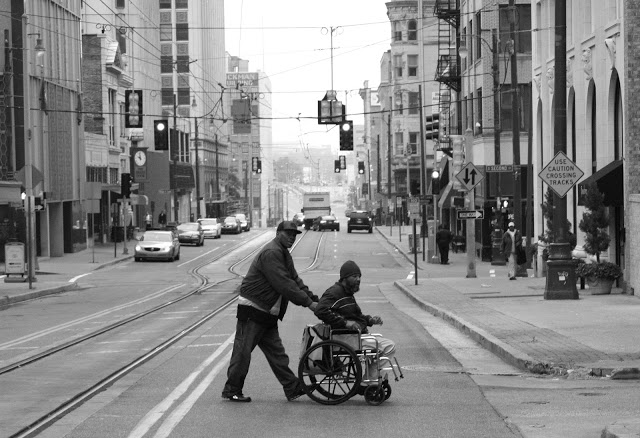Compassion seems to be a universal virtue and value that most people, religions and spiritual traditions aspire to.
Unfortunately many times when we read about compassion in a book it can seem very esoteric and alien to our everyday life. None of us have been canonized as saints—so the whole notion of living in compassion can feel somewhat out of reach.
However, like most things such as awareness, kindness or mindfulness—compassion is just another quality of being that we can cultivate. The spiritual teachers who have had the biggest impact on the world tend to remind us that compassion is no different than a muscle that we can learn to flex.
There are practical and common sense ways to cultivate compassion in our daily lives. The two most important questions are:
1)What is compassion?
2) Why do we want to feel it?
Compassion can be thought of as the extension of understanding and love. We can start with ourselves and then let this understanding reach out to our fellow human beings. It is the bedrock of an enlightened society which is founded on basic goodwill toward others, and loving kindness.
Without it, people tend to isolate themselves through judgement, cruelty and lack of awareness. Where compassion brings possibility, its opposite—the complete lack of compassion—brings limitation. When we are not compassionate we fail to see others as ourselves which blinds us to embracing how interconnected we all are as living breathing human beings.
Let’s face it—it feels better to be compassionate. Whoever said it felt good to be petty, harsh, judgmental and mean? Those are diseases of the mind and soul (that may eventually affect the bio-chemistry of our body as the mind/body are intricately woven together).
Compassion leads us to a sense of connection with others around us and can root us into the purpose for our existence because it reminds us that we all basically want the same things in life—how we go about getting those things may be different. In fact, perhaps it is not about “getting” at all. We may have conditioned responses from our culture, familial background, peer group or country that veil appropriate ways to experience happiness and contentment.
The teaching of compassion reminds us that no one is essentially bad, many spiritual practices point to this. What can happen to a person is that they find themselves prey to some limiting belief system, spell or poison arrow that adversely affects their mind and causes behavior that does harm.
If we look at the mind as a computer, we can say that their hardware is good but their software needs an upgrade. Perhaps, their software is under the influence of a virus and is causing their hardware to malfunction. When we believe in each person’s essential goodness, we can look at the behavior and say, “They need to update their mental software. It is causing distortions in the world.” Many people create suffering in the world for seemingly altruistic reasons—unbeknownst to them that they may be doing damage.
Here are three practices that can help us cultivate compassion in our lives:
1) Realize that we are all born and we all die. We all come into the world with nothing and we leave with nothing. This is unavoidable. When we really start to think and feel this it can help us prioritize a change of action. It shows us that what we do in the meantime between the polarities of life and death makes a difference. Being mindful and aware of the effect of our behavior helps us to clarify the whole picture of life, this experience on earth, and our purpose.
2) Go out into the world and visualize everyone’s heart beating and breathing. Each person we meet has insecurities, strengths, weaknesses and emotions that creates a commonality. We are all essentially the same. When we realize this people will automatically feel a rapport—they will feel more accepted. Each person is our mirror reflecting to us what we need to see to learn. Most of our communication with each other is unconscious. It is more affected by what goes on inside of us than our words, and what we are actively doing.
3) Never underestimate the power of changing our inner landscape. When we can come from a different place, have a different sensation and radiate that new experience out into the world we can affect change faster. Countless spiritual teachers reminds us of this—change our internal world, and that will change what we radiate out, which in turn can change our experience with people. No matter how bad the situation may seem this can bring us freedom from suffering.
It is important to realize that compassion and the alleviation of suffering can be very practical. It is something that we can practice everyday in our work, relationships and friendships. We needn’t leave the country on a pilgrimage (although that is always an option) in order to become kinder individuals who offer greater service.
It can be very simple, by being a little more mindful and aware we can inject compassion into our lives and feel better about everything. This will change how we interact with ourselves, others and how we spend this precious time on Earth. A little internal change and contemplation can ripple out and create massive shifts and be a positive force. To quote Gandhi, we can all strive to be the change we wish to see in the world.
Love elephant and want to go steady?
Sign up for our (curated) daily and weekly newsletters!
Editor: Travis May
Photo: Wiki Commons












Read 0 comments and reply